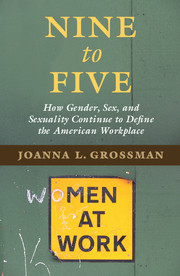Book contents
- Frontmatter
- Dedication
- Contents
- Foreword
- Acknowledgments
- Introduction
- PART I WHAT IS SEX DISCRIMINATION?
- PART II SEXUAL HARASSMENT
- 12 Workplace Affairs and Sexual Favoritism
- 13 Lolita at the Office
- 14 Sex Talk in the Writers’ Room
- 15 Sex Behind Bars
- 16 When the Supervisor Bullies Only Women
- 17 The Equal Opportunity Harasser
- 18 Periodontal Perils
- 19 Punishing Effeminacy
- 20 Late-Night Affairs with David Letterman
- 21 Why Herman Cain Has Not Been Able to Talk His Way Out of His Exploding Sexual Harassment Scandal
- 22 Why Hostile Environment Harassment Is a “Continuing Violation”
- 23 When Sexual Extortion Is Successful
- 24 The Consequences of Failing to Complain about Harassment
- 25 Who Is Responsible for Sudden, Severe Harassment?
- 26 Chinks in the Harassment Law Armor
- 27 Do Employer Efforts Prevent Harassment or Just Prevent Liability?
- 28 Who's the Boss?
- 29 Costly Mistakes
- 30 Hands Off the Merchandise
- PART III PREGNANT WOMEN AND MOTHERS AT WORK
- PART IV FEMALE BREADWINNERS AND THE GLASS CEILING
- Conclusion
- Notes
- Index
13 - Lolita at the Office
from PART II - SEXUAL HARASSMENT
Published online by Cambridge University Press: 05 May 2016
- Frontmatter
- Dedication
- Contents
- Foreword
- Acknowledgments
- Introduction
- PART I WHAT IS SEX DISCRIMINATION?
- PART II SEXUAL HARASSMENT
- 12 Workplace Affairs and Sexual Favoritism
- 13 Lolita at the Office
- 14 Sex Talk in the Writers’ Room
- 15 Sex Behind Bars
- 16 When the Supervisor Bullies Only Women
- 17 The Equal Opportunity Harasser
- 18 Periodontal Perils
- 19 Punishing Effeminacy
- 20 Late-Night Affairs with David Letterman
- 21 Why Herman Cain Has Not Been Able to Talk His Way Out of His Exploding Sexual Harassment Scandal
- 22 Why Hostile Environment Harassment Is a “Continuing Violation”
- 23 When Sexual Extortion Is Successful
- 24 The Consequences of Failing to Complain about Harassment
- 25 Who Is Responsible for Sudden, Severe Harassment?
- 26 Chinks in the Harassment Law Armor
- 27 Do Employer Efforts Prevent Harassment or Just Prevent Liability?
- 28 Who's the Boss?
- 29 Costly Mistakes
- 30 Hands Off the Merchandise
- PART III PREGNANT WOMEN AND MOTHERS AT WORK
- PART IV FEMALE BREADWINNERS AND THE GLASS CEILING
- Conclusion
- Notes
- Index
Summary
Typically, a sexual harassment plaintiff must prove that her supervisor's advances were unwelcome. This is a standard element of the cause of action. But what if the supervisor had sex with the plaintiff when she was below the age of consent? Must his advances still be proven unwelcome? Or in harassment law, as in the criminal law pertaining to statutory rape, is the underage person's attitude toward the sexual conduct irrelevant?
According to the U.S. Court of Appeals for the Seventh Circuit – addressing a claim under Title VII of the Civil Rights Act of 1964 – the answer is that an adult's advances toward an underaged teen need not be unwelcome in order to be actionable.
Under the law of the relevant state, Illinois, the plaintiff in that case was incapable of giving valid consent to sexual intercourse; she was sixteen and Illinois's age of consent is seventeen (or, in special circumstances, eighteen). Thus, the sex she had with her supervisor was a crime on his part: statutory rape. On the basis of this fact, the appeals panel – in an opinion written by noted conservative judge Richard Posner – held that the plaintiff could win her case whether or not she could prove that her supervisor's advances were unwelcome.
This ruling thus creates, in effect, a special doctrine for below-the-age-of-consent teenagers who experience sexual harassment at work – under which these teens can prove their cases even if they welcomed their supervisors’ advances.
THE FACTS AND ALLEGATIONS OF THE CASE BEFORE THE COURT
The plaintiff in the case was known only as “Jane Doe” in court papers and the appellate opinion. The sixteen-year-old Jane worked at an ice cream shop, Oberweis Dairy, as a scooper. A twenty-five-year-old man named Matt Nayman was her shift supervisor.
According to Jane, Nayman created a hostile work environment for her and the other female scoopers. For instance, some of the evidence indicated that Nayman regularly hit on the girls he supervised. One witness testified that he would grope and kiss the girls, as well as grab their butts. He also invited them to his apartment, and had sex with two other girls before turning to Jane. While Jane made no claim that Nayman forcibly raped her, Nayman was prosecuted, convicted, and imprisoned for statutory rape.
- Type
- Chapter
- Information
- Nine to FiveHow Gender, Sex, and Sexuality Continue to Define the American Workplace, pp. 83 - 87Publisher: Cambridge University PressPrint publication year: 2016



